

Sara Winther, who represented New Zealand in the Laser Radial class in London in 2012, has recently returned from the 2020 Olympics where she coached Hungarian Radial sailor Mária Érdi. She tells her story of a very different Olympic Games to Sarah Ell.
My journey to Tokyo 2020 – or 2021, as it turned out – began in a way five years ago, at the 2016 Olympics in Rio. I had narrowly missed out on selection for the New Zealand team for the Games myself, but Irish sailor Annaliese Murphy asked me to come over to Brazil to be her training partner for 10 days, leading up to the event.
I’d met Annaliese at the London Olympics, where she finished just out of the medals, and we got on really well. But she had got into a really weird headspace – she had convinced herself she couldn’t sail in the light. We went sailing together the first day I arrived in Brazil, and from that moment we started making progress. She had her coach Rory Fitzpatrick there, but I could coach her from the perspective of really knowing the boat and how it feels, and being right there sailing with her – stuff you just can’t get from being on the coach boat, you have to be doing it yourself. I ended up staying sailing with her right up to the Games, in which she sailed a really consistent series and won the silver medal, just six points off gold.

Mária training in Lanzarote.
Working with Annaliese had really made me think about the psychological side of sailing – how what’s going on in your head can make or break your performance on the water. I’d seen her go from having almost completely given up believing in herself and her ability, to winning an Olympic medal, over a really short space of time.
I’d always really enjoyed coaching, especially the mental side of it – you can coach someone on the physical and tactical side of racing but unless they’re mentally in the right place, it kind of doesn’t matter what you tell them. Earlier, in between campaigning and coaching stints, I’d completed a Bachelor of Business, majoring in Sport Management, and I decided to start studying sports psychology. Back in New Zealand I enrolled to do first a graduate diploma, then a post-grad diploma, and then a master’s degree.
Then in mid-2019, I got a call out of the blue. Hungarian Radial sailor Mária Érdi got in touch to ask me if I would coach her for the upcoming Radial world championships in Sakaiminato, Japan. I was interested immediately: Mári was someone I had kept an eye on since Rio. Even though she was young – she was only 18 when she sailed in the 2016 Games, and finished 14th – she was obviously talented, and would definitely be someone I would be keen to work with. Plus, I was a penniless student and this would pay a few bills. . .
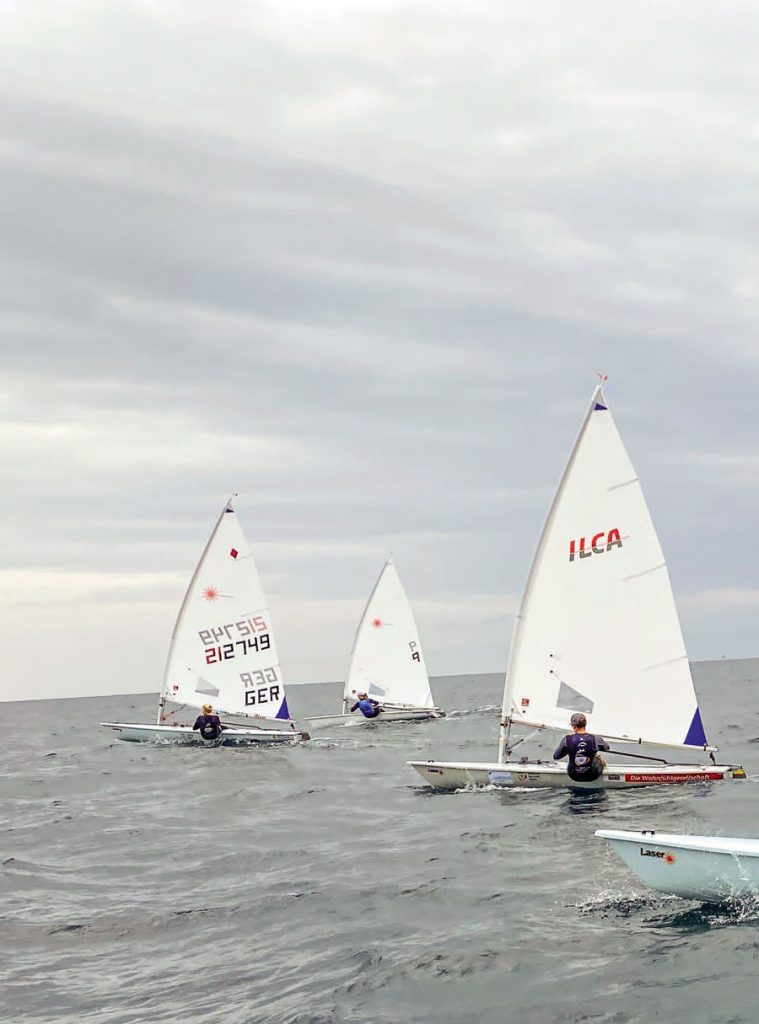
I met her properly for the first time at the airport and we got on really well. Our first event together was the Worlds, where she finished 23rd, but then she did the Ready Steady Tokyo regatta (aka the Olympic test event) and finished third – the best result of her career to date. She asked me if I was keen to continue working with her, and I could really see her potential, so I agreed to cut back my studies to part time and take on the challenge of seeing if she could go all the way to a medal position at Tokyo 2020.
I went to Europe with her for the rest of the northern hemisphere season, then came home for the New Zealand summer. Early in 2020, I was just about to leave for Spain to rejoin her when Covid really started to kick off in Europe. Regattas were being cancelled, then Spain shut its borders. Things were not looking good. I suggested Mári try to get down to New Zealand so we could sail here, but of course it was all going pearshaped here too and we went into our own lockdown.
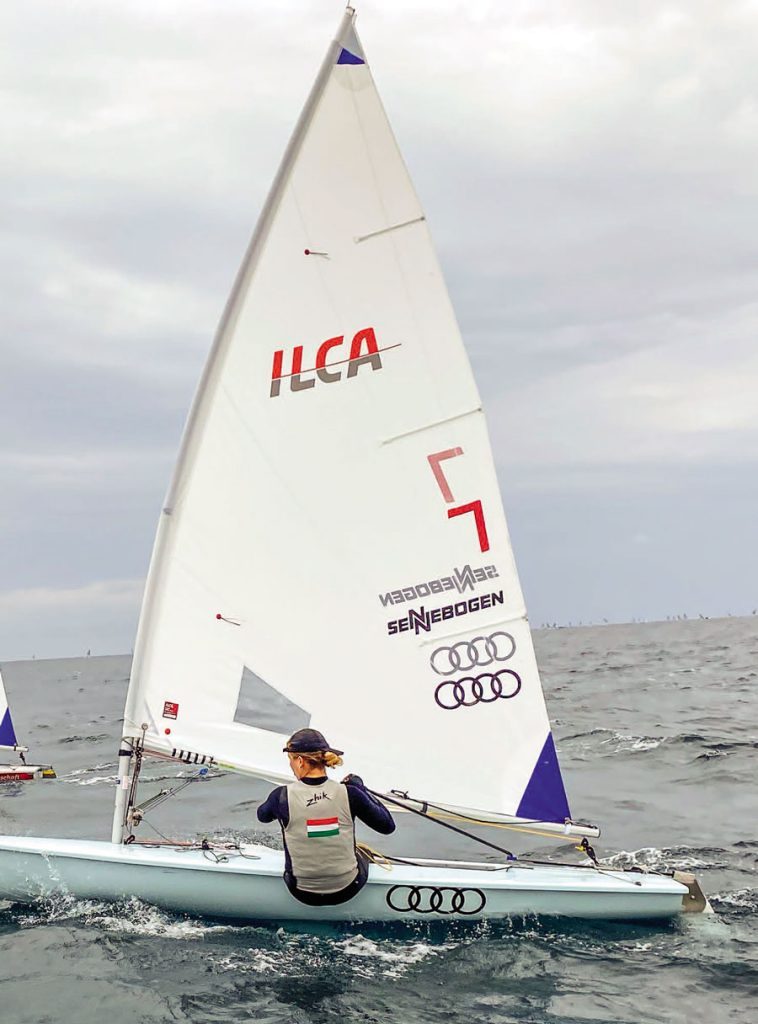
Close racing in conditions that were mostly lighter than predicted.
As well as being stuck in the house, it was an anxious few months as we waited to see if the Tokyo Games would be postponed. Once that decision had been made it was just a matter of watching and waiting for the world to open up a little bit, and for sailing to get going again in Europe. I flew back to Hungary in August 2020 and had a productive few months training and competing in whatever events were being held. It was still very much up in the air what would happen with the Olympics, but we thought we may as well go ahead and do whatever training we could.
I managed to get home to New Zealand for Christmas, then in the new year headed back to Europe. Like quite a few other yachties, we based ourselves at Lanzarote in the Canary Islands, where there wasn’t much Covid but lots of holiday places up for rent, due to the fact that British tourists couldn’t go there for their summer holidays. It was lovely and warm, with great sailing conditions and plenty of breeze and waves, which simulated the conditions we were expecting in Japan. It was a really great place to be, as although the country was in a lockdown, we were allowed to go sailing and cycling, and the coffee wasn’t too bad.
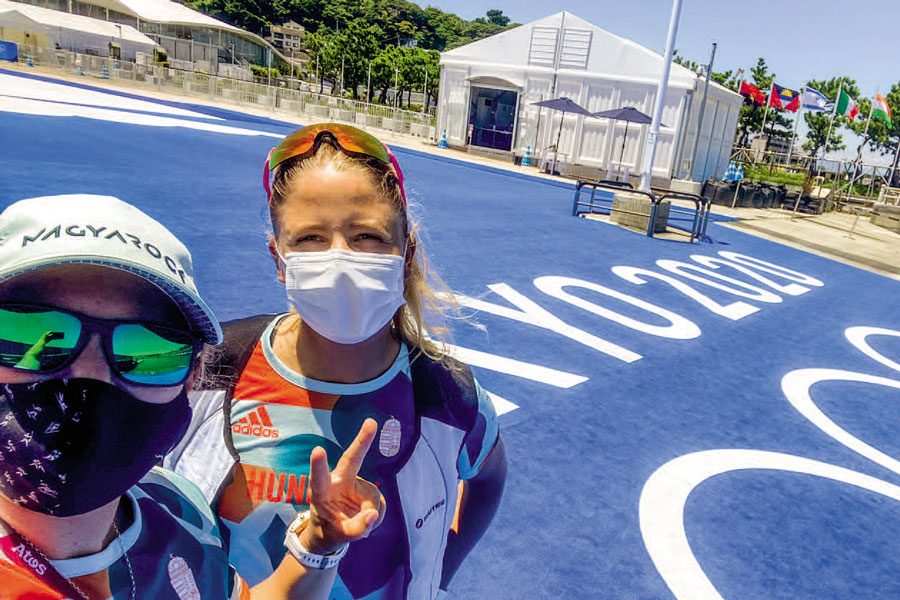
Sara and Mári at the Olympic Village, Tokyo.
Events were still being cancelled and moved around, but Mári had a couple of good results, winning a silver medal at the World Cup event in Medemblik, Holland in June. But it was hard being away from New Zealand, which at that time had no Covid restrictions in place. Fortunately I was able to get my Covid vaccination along with the Hungarian Olympic team, but moving around even within Europe was difficult. However, by the time we left Hungary they were just lifting the last of their restrictions on mask-wearing and gathering, as they had reached such a high level of vaccination.
It was a huge relief when it got to the point when it seemed like the Games were definitely going to go ahead. We had originally planned to be in Japan from May but in the end we got there 10 days before the Games were due to start, which was the first time anyone was allowed to access the venue or get out on the water.
Down at the sailing venue it was almost like ‘normal’, and you wouldn’t have known the pandemic was going on, except people were making an effort to keep further apart. All the boats were decaled up and everything was set up like what you would expect at the Games, but there was just nothing fun or extra to do once you left the venue.
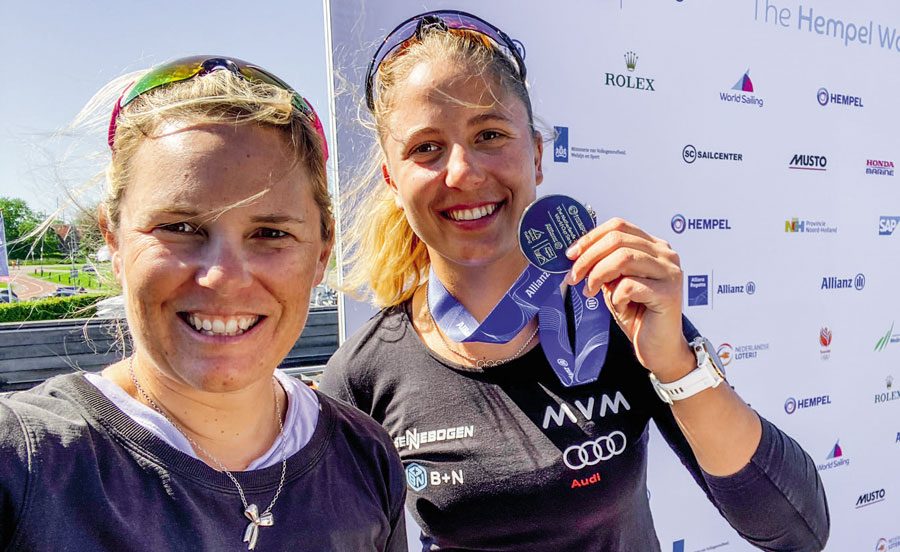
Success for Mári and her coach in the Hempel World Cup Series in Holland, June 2020, where Mári won silver.
The one time we went up to the main venue in Tokyo and had lunch at the main athletes’ dining hall, there was definitely no social distancing going on! There were two huge floors the size of two basketball courts each, full of athletes eating and talking and hanging out. But it was pretty safe because everyone was vaccinated, and we had to check in with an app, get tested every day and were temperature-checked every time we entered and exited the venue.
There was a lot of confusion about accommodation and where we were allowed to stay; some of the big teams had their own accommodation organised but to do that you had to book out a whole hotel. In the end Mári stayed in the sailing village with the other Hungarian sailors, and I stayed in an unofficial hotel nearby with some media and members of the public – so much for having an Olympics ‘bubble’! We got a Japanese breakfast but otherwise we had to cater for ourselves, so it was Uber Eats every night, comparing meals with the other refugees. But at least it was only about 20 minutes from the venue, when some teams were 40 minutes or even an hour away, which made for a lot of travelling.
It made things a bit hard from a coaching perspective; I’d try to do a quick debrief with Mári when we came off the water each day, but mostly I’d go back to the hotel and go through the racing again on the tracker, then do a more detailed debrief over the phone. The coaches had to sit in a little box below the start line – you couldn’t follow the boats around the course like you can at other events – so I actually learned a lot more from watching the tracker to figure out what had happened.
As is always the way with big regattas, the conditions weren’t anything like what we had been told to expect. The sailing venue at Enoshima is on a big, south-facing bay about 50km south of Tokyo, and the predominant conditions are a fresh onshore breeze and big waves. For the 10 days of training it had been the same every day: 9 knots onshore. But over the course of the Olympics, the average wind speed was just 8.6 knots, and mostly fickle offshore. Also, we weren’t allowed to launch early and get out on the water and suss out what was going on: we only had 10 minutes on the course before the start each race day, which was really tough.
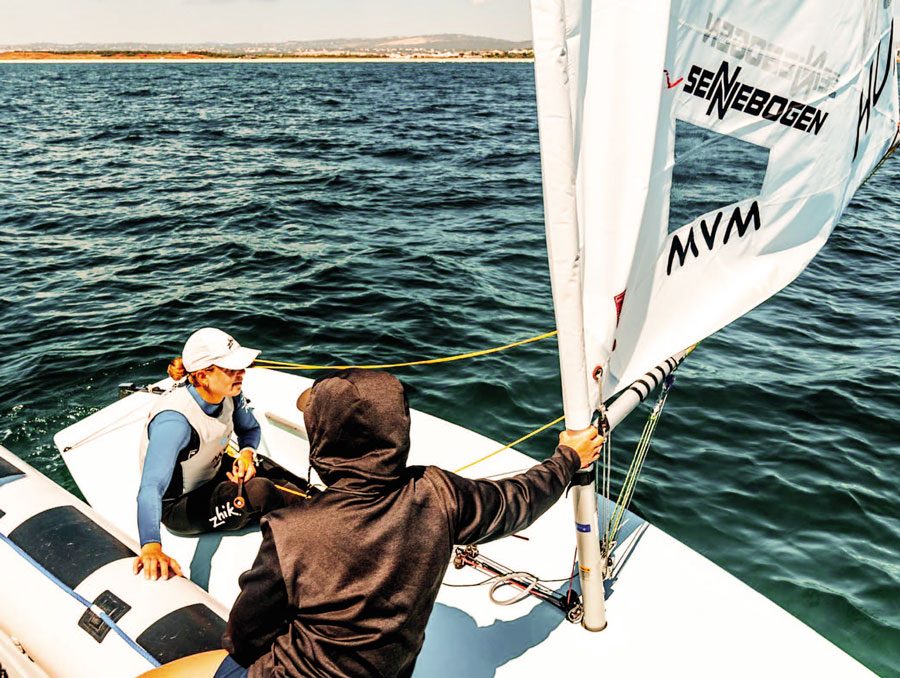
Unlike pre-Olympic training, due to COVID-19 restrictions, coaches weren’t allowed on the water in Tokyo.
Mári was going really well in the first race but then she made an expensive error on the second lap and ended up 19th. That ended up pretty much being the story of the regatta: she would be doing well but kept making small but costly errors, and struggled a bit mentally to put bad races behind her. I had to work doubly hard to try to keep her head in the game and her hopes alive, but she couldn’t turn it around, and that was hard to witness. In the end, even though she scored a second placing in one race, she just missed out on the medal race and finished 13th overall.
I think it’s really pertinent that the average age of the top 10 sailors was 29 – Dutch sailor Marit Bouwmesster, who won the bronze medal in Tokyo, silver at London 2012 and gold at Rio, is 33 – and Mári is only 23. Based on her first mark roundings in each race, she was good enough to get silver – she just kept making errors in the second lap. She was still in attack mode up the second beat, when she really needed to be defensive. She was also struggling to manage a lot of big emotions. To succeed at this level, you have to be almost robotic, and be able to make decisions without emotion coming into it. She has already done a lot of work on this – by the end of the regatta she’d come a long way – but it was a hard way to learn a big lesson.
Once the games were over, we pretty much had to get out of Japan right away. Luckily I had secured my spot in New Zealand MIQ a few months earlier, so we said our goodbyes and I flew home for my two weeks at the Holiday Inn. I was just 30 hours away from freedom and a decent coffee for the first time in months when the government announced we were going into a Level Four lockdown. As I write this, I am still stuck at home, working away at my study, waiting to be allowed out of the house.
I feel really grateful that the Olympics was able to go ahead, even under difficult conditions, and that all the athletes who had worked so hard over the past five years got their chance to compete.
For now, I am going to focus on my studies and possibly do some local part-time coaching. Mári now has the opportunity to find a full-time coach to take her to the next level, and I am going to hit the books for the next two years and concentrate on taking my place in the realm of sports psychology.
My Olympic and international competition experience, both as a sailor and a coach, has given me massive insights into what sailors and other sportspeople need to reach their potential from a psychological perspective, and I look forward to continuing to make a positive difference in athletes’ lives.
Oh, and having a decent coffee made by a professional – hopefully soon! BNZ




